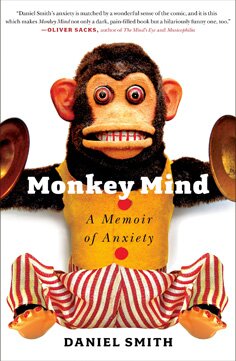Most Fridays, when I’m not too overwhelmed by work and life, I publish an exchange with my mother, Marilyn Smith — psychotherapist, anxiety expert, and genetic wellspring of my neuroses — about anxiety and anxiety disorders. Sometimes I forgo these exchanges and publish questions from readers, and my mom’s responses. If you have a question about anxiety you’d like me to share with my mother, please email me at [email protected]. (Note: I reserve the right to edit submissions [delicately, lovingly] for grammar, length, etc.)
Dear Dan’s Mom: I have been thinking about having my first child within the next year or so, but I’m anxious about weaning myself off of Klonopin (which is the only medication that truly helps me, after a decade of experimentation) and Neurontin (which was prescribed to me years ago for racing thoughts). Of course I will be doing this under medical supervision, but I was wondering if there was any general advice you could offer about going through the process. I worry that being off my meds will put me “over the edge” and prevent me from functioning in both my personal and professional life. Also, I’m assuming that there aren’t any “safe” anxiety meds that can be taken while pregnant. Thank you so much for your help! —Wannabe Mommy
Dear Wannabe Mommy: I’m glad to hear that you’ll be doing the wise thing and weaning yourself off of your medication under the supervision of a psychiatrist. I’m not an M.D. — I can’t and don’t prescribe medication — but in my experience many young women face the challenge you’re now facing and most of them, you’ll be happy to know, do quite well. In fact, I find that many women feel not worse but better when they’re pregnant. They have less anxiety, fewer worrying or obsessive thoughts, and an improved mood. Many express surprise by how well they doing off of their meds. (Hormones: they can be a wonderful thing!) With any luck, this will be your experience, too. In the meantime, there are things you can do now to manage the stress and anxiety that can continue during pregnancy. These will be familiar suggestions if you’ve been reading my advice to others (and to my stubborn son): meditation, breathing exercises, cardiovascular exercise, eating healthy, and eliminating caffeine. Also, if you haven’t already done so, get a referral to a therapist who specializes in the treatment of anxiety disorders. You’re going to be a mom: trust me, you’ll want all the help you can get. —Dan’s Mom
Dear Dan’s Mom: I’m a 29-year-old Italian architect and I’ve had anxiety for some time now. During my university years, I recall being confident and articulate in front of my teachers and fellow students, but when I started working things started to go wrong. Meetings with superiors and colleagues became moments of terror. I’d evade responsibility and make up stories not to be there. And when I did have to be somewhere, I’d end up soaked in sweat and completely out of it. Since then the feeling has branched out into all sorts of situations. It’s like a fear of making a fool of myself. I fear looking sweaty, red, uncomfortable, and inarticulate. Then everything piles up: fear of failure, of getting stuck, of not doing enough with my potential, of time passing. I feel the urge to do so much. I have so many ideas. But I always run away so as not to face anxiety-triggering situations. Now I’m starting a new job and I feel the stakes rising. I don’t know where all this comes from. I know it is something about seeing myself fail, others seeing me fail, being in the spotlight, figures of authority questioning me. It is very weird, as I know that in reality everything is and will be fine. But inside it doesn’t add up, and the fear and insecurities are powerful. How can I single out the elements that trigger my anxiety and start working on them? —In the Spotlight
Dear In the Spotlight: It is difficult from your letter to pinpoint exactly what the “elements” are that trigger your anxiety in social situations. It sounds like you were doing just fine until the stakes got bigger and you were given more responsibilities. The fear of being judged negatively by authority figures is often what triggers panic attacks with people who suffer from anxiety in these types of situations. But then the extremely unpleasant physical symptoms you felt during the attack — feeling shaky and sweaty, your face getting flushed and your heart racing — became the target of your avoidance. After all, why would you want to go into a situation where you’re going to have these sensations? Where you worry others might notice your anxiety? But wait, signore, has anyone really noticed? I suspect not many, if any at all. And if they have, so what? I would suggest you take a calming breath before going into the next situation — but do go into it. Avoidance only brings down the fear temporarily. In the long run it increases the anxiety. Good luck with your new job! You’re going to be great! —Dan’s Mom
Dear Dan’s Mom: I don’t like to step on manhole covers or bulkhead doors or metal grates. I don’t like to stand too close to the edge on train platforms or be trapped inside elevators for more than fifteen seconds. I worry that the cab driver is going to lock me inside like in that movie The Bone Collector and murder me before we get to my destination. What do you suggest? —Storyteller
Dear Storyteller: You have a marvelous imagination and have created some great newspaper headlines in that head of yours. I can just visualize your terror as you’re falling through a manhole cover. Then there’s a scene change and you’re in a cab screaming, struggling to stay alive. Aaaaaaaaaa! But images and thoughts such as these are unproductive (unless you’re writing a horror movie) and can certainly trigger feelings of anxiety and/or worry. Sounds like you may need to rewrite these awful scenarios and replace them with more realistic images. Or you can try extinguishing these images by spending some time every day repeatedly visualizing the scary scenes. You can even write down the scenarios, record them on a loop tape and listen for 30 minutes a day. After a short while, I suspect you’ll be laughing at the absurdity of your irrational fears, which will take the power out of them, which in turn will help kill off the anxiety. Can you be 100% certain that nothing bad like this will happen? Of course not. No one can give you that guarantee. What you do have are the odds. And the odds are greatly in your favor. —Dan’s Mom
[Mother-Protecting Legal Disclaimer: The contents of this site are for informational purposes only. The content is not intended to be a substitute for professional medical advice, diagnosis, or treatment. Always seek the advice of your physician or other qualified health provider with any questions you may have regarding a medical condition. If you think you may have a medical emergency, call your doctor or 911 immediately. This site does not recommend or endorse any specific tests, physicians, products, procedures, opinions, or other information that may be mentioned on the site. Reliance on any information provided by this site or others appearing on the site is solely at your own risk.]







Dear Dan’s Mom,
This will sound borderline offensive to Dan (and perhaps to you), but I’m not trying to draw any parallels here – but rather, draw on your wellspring of knowledge as a mother-of-an-anxious-son/psychotherapist…
I just ended a long-term relationship with a born and bred New Yorker, who (in retrospect more than I realized) is a pretty anxious, self-centered person. But he’s also lovely, generous and very smart. He’s just self-centered in that ‘I’ve been in therapy since I was 6; was schooled at one of those “we massage your unique brilliance!” Brooklyn private schools; and was raised by a seriously anxious, overindulgent psychoanalyst mother’ kind of way. I suppose I don’t really have a question here, since things are over and liable to stay that way. But part of me just wants to scream at my ex, his mother, and his therapist: “what the &$%$#! is wrong with you!?” Therapy is supposed to help people, in some way, not offer a permanent, self-fulfilling outlet for neuroses. Mothers, especially ones trained to be therapists (!!), are supposed to nurture, but also launch and CHALLENGE their offspring. And my ex, in an ideal world, should be able to accept (if not welcome) change, most importantly within himself. It’s just so unbelievable to me that with so many advantages, and so many mental health resources, someone like my ex could still fundamentally view the world as a series of events and moods that are supposed to conform to his wants and needs. My parents weren’t perfect, but at least they didn’t lead me to believe that the most important thing in life was whether I felt like I was being perfectly emotionally fulfilled at all times, regardless of my posture toward the world and other people.
So yep, no question; just disgust, disappointment and anger at feeling the very personal pain of what, at least in New York City, seems like a fairly cliche problem! Eat your heart out, Woody Allen.